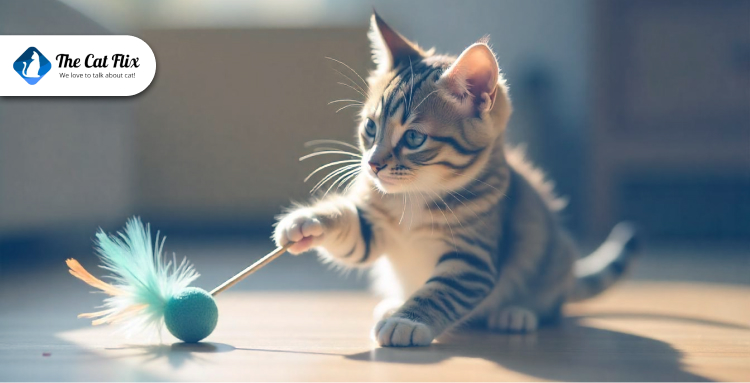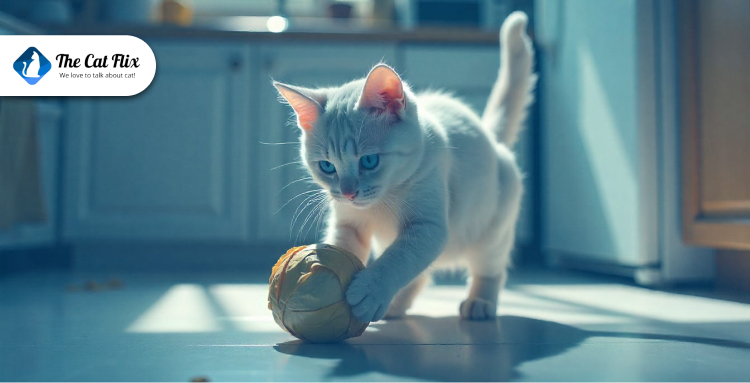Ever feel like your cat transforms into a tiny tornado the moment you’re ready to sleep? One minute, they’re peacefully napping all day, and the next, they’re zooming across your furniture at 2 AM like they just downed an energy drink. I’ve been there too.
Many people assume cats are nocturnal, but they’re actually crepuscular. But if your cat seems to have a personal vendetta against your sleep schedule (just like mine), there’s likely more to it than just instincts. Let’s Find out why your cat plays at night—and how to help them (and you) sleep better.
Why Does Your Cat Go Wild at Night?
If your cat treats the night like their personal playtime, there’s a good reason for it. Cats aren’t just randomly picking the worst possible hours to unleash their energy—there’s actual science behind it.
a) Instinctual Crepuscular Nature
First things first—cats aren’t actually nocturnal. A lot of people think they are, but in reality, they’re crepuscular, which means they’re naturally wired to be most active during dawn and dusk. This comes from their wild ancestors, who hunted at these times when it was easiest to catch prey.
Even though your cat doesn’t need to hunt for food (since they get the royal treatment with their bowl of kibble), those instincts are still there. Their body clock tells them that early mornings and late evenings are the perfect times to be on the move. So, when you’re winding down for the night, your cat’s instincts are telling them it’s go-time.
b) Too Much Napping, Too Much Energy
If your cat spends most of the day snoozing in a sunbeam, don’t be surprised when they suddenly turn into a tiny parkour athlete at night. Cats sleep a lot—sometimes up to 16 hours a day—but too much daytime napping can leave them with way too much energy when you’re trying to sleep.
Think of it like this: If you laid around all day doing nothing, you’d probably have trouble falling asleep at night, too. Cats need physical and mental stimulation throughout the day, or else they store up all that energy and let it out when it’s least convenient for you.
c) Craving Your Attention and Interaction
Cats may act all independent, but they actually love attention—especially from their favorite humans. If you’re gone most of the day, your cat might spend that time sleeping, which means by the time you’re home and winding down, they’re just waking up and looking for interaction.
They also learn fast. If your cat has ever meowed, pawed at you, or started playing in the middle of the night and you’ve responded—even if it was just to shush them or give them a treat to quiet down—they’ve learned that their nighttime antics get them attention. So, they keep doing it.
d) Food and Routine Habits
If your cat gets used to being fed late at night or early in the morning, they might start associating those hours with food time. Even if you don’t feed them at 2 AM, their body might still wake them up around then, thinking it’s mealtime.
This is even more of an issue if you’re in the habit of giving them snacks when they wake you up. If they’ve learned that waking you up = food, they won’t stop anytime soon.
How to Help Your Cat (and Yourself) Sleep Better: Proven Solutions

Now that we know why your cat is hyper at night, let’s talk about how to fix it. The goal isn’t to completely change your cat’s natural behavior (because let’s be real, cats do what they want), but rather to shift their activity to times that don’t wreck your sleep. With a few adjustments to their routine, you can help your cat burn energy before bedtime and settle down when you do.
a) Tire Them Out During the Day
If your cat has energy to burn at night, it’s probably because they weren’t active enough during the day. To prevent those midnight zoomies, make sure they get plenty of structured playtime throughout the day, especially in the morning and evening.
Here’s what works best:
- Play before you leave for work and again in the evening. This mimics their natural hunting patterns.
- Use interactive toys like feather wands, laser pointers, or balls to get them running and jumping.
- End play sessions with a “catch” moment. Instead of stopping suddenly, let your cat “catch” the toy. This satisfies their hunting instincts and helps them wind down.
A tired cat is a sleepy cat—so the more active they are during the day, the less energy they’ll have for nighttime chaos.
b) Keep Their Mind Busy
Cats don’t just need physical exercise—they need mental stimulation too. If your cat is bored all day, they might be storing up energy and looking for entertainment in the middle of the night.
Here’s how to keep their minds busy:
- Puzzle feeders and treat-dispensing toys. These make mealtime more engaging and give your cat a challenge.
- Rotate their toys. Cats get bored with the same toys, so switch them out every few days to keep things interesting. (Also Read: How to Rotate Cat Toys to Keep Your Cat Engaged)
- Cat trees, tunnels, or window perches. Give them fun spots to explore and climb so they can entertain themselves while you’re busy.
The more mental engagement they get during the day, the less likely they are to wake you up for attention at night.
c) Feed Smart for Better Sleep

What your cat eats—and when they eat—can affect their sleep patterns. In the wild, cats hunt, eat, groom, and then sleep. You can use this to your advantage by feeding them their biggest meal before bedtime to trigger that natural post-meal sleepiness.
Try this:
- Feed your cat a hearty meal in the evening. This helps them feel full and relaxed.
- Use an automatic feeder for early morning meals. If your cat wakes you up demanding breakfast, an automatic feeder can give them food at a set time—without involving you. (Check it out: 7 Best Automatic Cat Feeders)
This simple tweak can help shift their schedule so they’re ready to sleep when you are.
d) Make Their Sleep Space Cozy
If your cat doesn’t have a cozy place to sleep, they might roam around at night looking for one—or worse, trying to sleep on your head.
Help them settle down by:
- Giving them a comfy bed in a quiet spot. A soft, warm bed in a low-traffic area can encourage them to sleep through the night.
- Using calming aids like pheromone diffusers. Feliway or other calming sprays can help anxious or restless cats relax.
- Keeping the room dark and quiet. Close the blinds and turn off any unnecessary lights or sounds to signal bedtime.
Cats love routine, so if they associate a certain spot with nighttime rest, they’ll be more likely to settle there instead of keeping you up.
e) Don’t Give In to Midnight Mischief
This one is tough, but it’s crucial: If your cat meows, jumps on you, or plays at night to get your attention, don’t give in.
Here’s why:
- Any reaction—even telling them to stop—reinforces the behavior. Your cat learns that meowing gets a response, so they keep doing it.
- Consistency is key. The first few nights of ignoring them might be rough, but if you stay firm, they’ll eventually learn that nighttime is not playtime.
- If they’re truly restless, check if something’s missing. Did they get enough playtime? Are they hungry? Do they have a cozy sleep spot? If their needs are met, stick to ignoring their nighttime antics.
When to Worry: Medical or Behavioral Issues

Most of the time, a cat’s nighttime energy is just part of their natural behavior. But if your cat suddenly becomes way more hyper than usual or their behavior seems extreme, there could be an underlying issue. It’s always good to rule out any medical or stress-related problems before assuming it’s just their normal playfulness.
Could It Be a Health Problem?
If your cat is constantly restless at night, meowing excessively, or acting more energetic than usual, it might be worth a trip to the vet. One common medical condition that can cause unusual hyperactivity, especially in older cats, is hyperthyroidism. This happens when the thyroid gland produces too many hormones, speeding up their metabolism and making them feel wired all the time.
Signs of hyperthyroidism include:
- Restlessness, especially at night
- Increased appetite but weight loss
- Frequent meowing or vocalization
- Excessive grooming or a rough coat
If you notice these symptoms, don’t ignore them—a vet can do a simple blood test to check for thyroid issues.
Could It Be Stress or Anxiety?
Cats are creatures of habit, and any changes in their environment can make them anxious. If your cat is suddenly more active at night, think about what’s changed recently:
- New pets or people in the house? A new roommate, baby, or another pet could be making them anxious.
- Changes in routine? Did you start a new job or change their feeding/play schedule?
- New noises or surroundings? Loud construction, a move, or even a new piece of furniture can throw them off.
When cats are stressed, they often become more vocal, restless, or even destructive at night. If you suspect stress is the issue, try using calming aids like Feliway diffusers, providing more hiding spots, and sticking to a consistent routine.
When to Call the Vet
If your cat’s nighttime behavior is sudden, extreme, or paired with other unusual symptoms (like weight loss, excessive thirst, or aggression), it’s best to get them checked out. A quick vet visit can rule out any medical problems and give you peace of mind.
Otherwise, if your cat is just being their playful, mischievous self at night, the solutions we covered earlier should help you reclaim your sleep—and your sanity.
More for you: Cat Behavior Problems: Dealing with an Aggressive Cat? Try These Simple Tips
Final Thoughts

If your cat treats your bedroom like a racetrack at 2 AM, don’t worry—you’re not alone. Cats are naturally wired to be active at odd hours, but with a few simple tweaks, you can help shift their energy to a more sleep-friendly schedule. Make sure they get plenty of play and mental stimulation during the day, adjust their feeding schedule, and create a cozy sleep space to help them settle at night. And if they still insist on waking you up, stay strong and don’t give in—consistency is key.
Have you dealt with a nighttime zoomies champion? What worked (or didn’t work) for you? Drop your thoughts in the comments, and if you found this helpful, pass them along to other tired cat parents who need a little peace and quiet.

